How the Alameda County Fair lost a $5 million bet to save horse racing
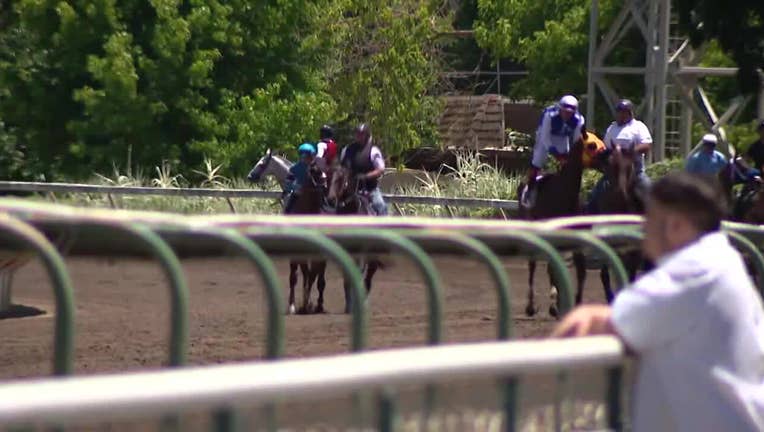
Horse racing at the Alameda County Fair in Pleasanton.
PLEASANTON, Calif. - When Golden Gate Fields in Berkeley closed last June, there was a feverish pitch from horse owners, trainers, jockeys, stable hands and racetrack aficionados to find a viable option to keep racing alive in Northern California.
Quickly, horse racing enthusiasts turned their attention to the Alameda County Fairgrounds in Pleasanton as the new home for horse racing in the region.
After all, the fairgrounds had a regulation-size, mile-long racetrack, and had successfully operated horse racing for decades each summer during the Alameda County Fair.
But Jerome Hoban, the CEO of the Alameda County Fair Association, had concerns.
He knew that the wealthy and powerful owners of Golden Gate Fields didn’t want horse racing in Northern California to compete with their Southern California racetracks and were determined to block Pleasanton from succeeding.
Hoban also knew that for horseracing to work at Pleasanton, the fairgrounds would have to buy out the golf concessionaire on the site when the horses from Golden Gate Fields moved in.
Nonetheless, Hoban heeded the calls of NorCal racing, and placed a big bet – his fair board spent millions on turning the Pleasanton fairgrounds into the new horse racing mecca for the region.
The bet never paid off.
Horse racing season last fall was cut short after a series of costly mishaps.
The Alameda County Fairgrounds is now on the hook for $5 million in losses and the fate of horse racing in Northern California is now in doubt.
"Horse racing isn't dead just yet," said George Schmitt, a wealthy East Bay horse owner who offered $2 million to save racing in Pleasanton and is now trying to launch his own horse racing company at the Alameda County Fair this summer. "But it's on its last legs."
$5M loss, ‘biggest disaster’
Altogether, the Alameda County Fair Association ended up losing $3.2 million when it bought out Pleasanton Golf Center to make room for the horses it took in from Golden Gate Fields and another $1.9 million it lost in horse racing last fall when it couldn’t attract betting platforms.
"This was the biggest disaster of my career," Hoban told KTVU in a series of candid interviews. "But it was all to save horse racing in Northern California."
Hoban said that in hindsight, he made several mistakes – with the best of intentions – as he tried to save horse racing from going under.
At the time, Hoban said he felt he had to try to bring all the Golden Gate Fields horses to the Alameda County fairgrounds, even though he said he knew it didn't make good business sense.
"There was so much emotion, so many jobs at stake," Hoban explained. "I was damned if I do, and damned if I don't."
Hoban insisted the Alameda County Fair will go on this summer, though he admitted it is currently "squeaking by."
As a result, Hoban said that he had to take "abrupt action" last month by laying people off, making budget cuts and holding off on capital projects.
Some wonder if the mistakes could have been avoided.
Shawn Wilson, chief of staff for Alameda County Supervisor David Haubert, told KTVU that it seems like Hoban "took a swing and missed."
"But before you get up to the plate," Wilson said, "you should have talked to your partner, your landlord and asked for help."
The landlord in this situation is Alameda County, which owns the fairgrounds' property on Valley Avenue in Pleasanton.
The Alameda County Fair Association is a non-profit that acts as an "agent" of the county.
The fair association has 21 board members, from former Alameda County Sheriff Greg Ahern to Ryan LaLonde, the former communications director for then-DA Pamela Price.
"We have a lot of smart people," Wilson said. "Maybe we could have helped."
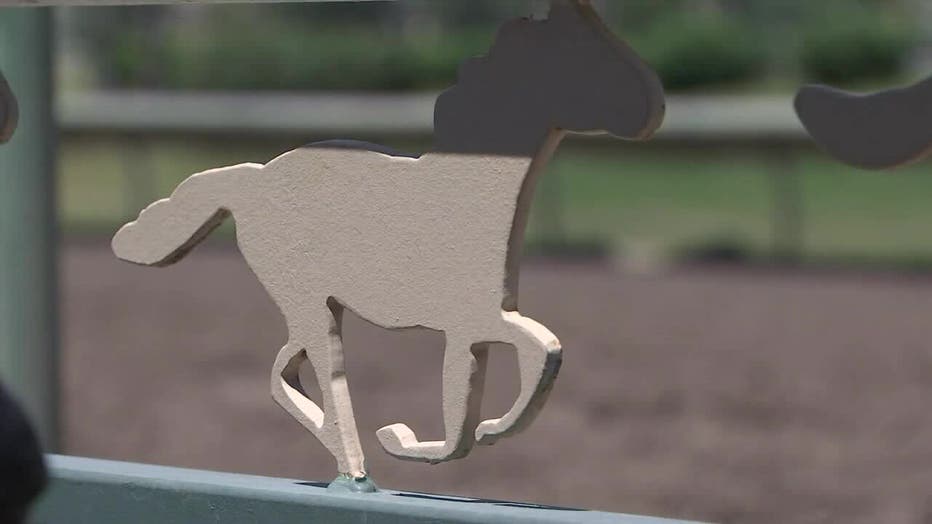
A horse racing emblem at the Pleasanton fairgrounds.
Piecing together the timeline
There are some critics who are specifically pointing fingers at Hoban and the fair board for their decisions leading up to the current financial debacle.
But it's not just one thing or one person that led to the horseracing failure: There are a confluence of factors that contributed to the seeming demise of horse racing in Northern California.
KTVU interviewed Hoban and Wilson, several horse owners and trainers, and also reviewed transcripts from the California Horse Racing Board, letters from the regional water board and U.S. Rep. Eric Swalwell to the Alameda County Fair, as well as minutes from fair board meetings to piece together a timeline of what happened.
The culmination of this timeline occurred last month, on March 25, with the eviction of 900 horses and 500 employees and families from the fairgrounds.

An aerial view of the Alameda County fairgrounds in Pleasanton.
Closure of Golden Gate Fields
June 2024
The closure of Golden Gate Fields in June 2024 came after years of animal rights activists protesting the deaths of horses at the tracks, as well as dwindling finances.
At the time, the owner of the Golden Gate Fields, a powerful Canadian company called The Stronach Group, headed by Belinda Stronach, said she planned to "double down on its prestigious racing and training venues at Santa Anita Park and San Luis Rey Downs," both of which are in Southern California.
The Stronach Group owns multiple horse racing tracks, including Santa Anita Park in Southern California, as well as betting platforms throughout the United States. The company says that thoroughbred racing and wagering are at the company's "core."
But moving to Southern California wasn't a viable choice for many of the out-of-work Golden Gate Fields employees, and many fought to stay in the Bay Area.
But who would have them?
Hoban said he first asked the Sonoma County Fair in Santa Rosa and the State Fair in Sacramento if they would step in to help.
Both said no.
So, Hoban said he reluctantly took in all of Golden Gate Fields' 900 racehorses because no one else would, and saying no didn't seem like a viable option either.
"Golden Gate Fields closed and everybody came our way," Hoban said. "Let it be said, I didn't think it was a good idea. It didn't make good business sense."

Horse trainers and jockeys move into RVs on the Alameda County Fairgrounds.
Still, Hoban said his fair association bought and built 400 more portable horse stalls to complement the 640 stalls the fairgrounds already had.
He had to upgrade the electricity and water lines. Horse trainers and their families moved into the RV campground, and some of their rents were subsidized by the fair association.
Hoban estimated that the fair and the California Authority of Racing Fairs, called CARF, put in about $2 million into this effort.
CARF comprises county and state fairs mostly in Northern California: Alameda County, Fresno County, Monterey County, San Joaquin County, and the California State Fair in Sacramento.
The group also includes four fairs in Southern California: the Antelope Valley Fair, the National Orange Show, San Bernardino County and Ventura County.
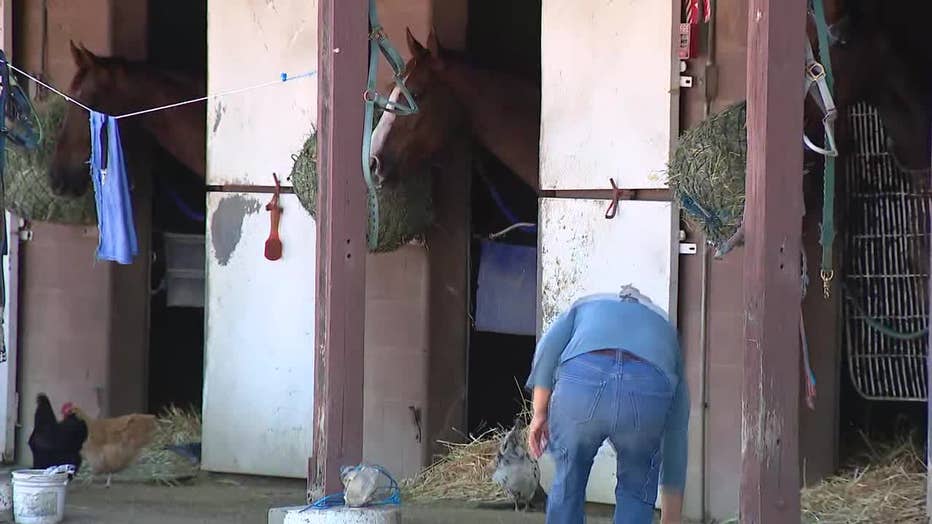
Horse owner George Schmidt leans over a stall at the Alameda County fairgrounds.
More horses, wastewater problems
July 2024
When the horses came to the Pleasanton fairgrounds, so did more horse waste.
In a July 2024 letter to the Alameda County Agricultural Fair Association, the San Francisco Bay Regional Water Quality Control Board, along with the city of Pleasanton and the Dublin San Ramon Services District, said that the fairgrounds were violating the federal clean water act by essentially mixing horse wastewater with storm water.
The water boards alleged that Hoban had known about this since 2008. The influx of horses made this worse, the letter states, and they accused the facility operators of not obtaining the proper permits to take in hundreds more horses.
The water board demanded that Hoban submit a plan to fix the problem and get the right permits.
At least one of the letters suggested Hoban had known about this problem for years and that he wasn't communicating well or being transparent.
Hoban denied that.
"We were in communication from the get-go and continue to be," he said.
In consequent discussions, it appears as though the water board would have worked with the fair over an extended timeline to remedy the situation, according to several people familiar with the issue, including Haubert's office.
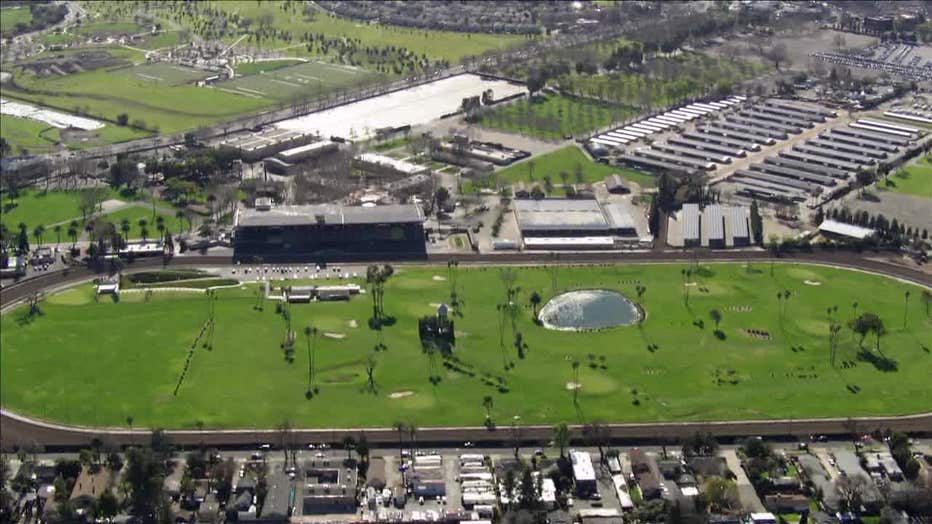
Pleasanton Golf Center in the center of the Alameda County fairgrounds racetrack.
‘Catastrophic’ golf course buyout
February 2024
Meanwhile, there was the tricky problem of horse racing and training at the Alameda County fairgrounds track and golf balls whizzing by.
The two sports don't mix.
And the fair association board ultimately decided that the horses took precedence.
Alameda County Fair Association board meeting minutes obtained by KTVU show the fair was poised to buy back the right of use to the nine-hole Pleasanton Golf Course, which is right in the middle of the horse track, for $3.2 million.
In February 2024, CARF voted to approve that deal and Hoban said the Alameda County Fair Association put up a $4-million line of credit.
Buying the golf contract from owner Dana Jeter essentially meant that golfing hours during racehorse time would be limited, and golfing could occur whenever the horses weren't outside, training or racing.
The fair association hoped to recoup the $3.2 million from the golf buyout with money that they believed would flow from betting on the races in the fall of 2024.
That money never came.
In retrospect, Hoban said laying the money out for the golf course in advance of securing betting contracts was "catastrophic."
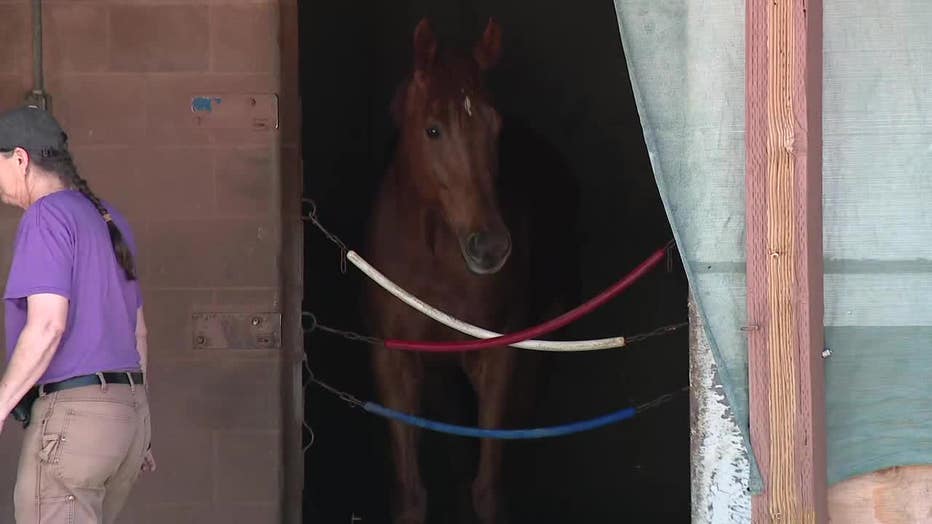
900 horses from Golden Gate Fields come to the Alameda County fairgrounds.
Horse board grants racing dates, Stronach disses NorCal
March 2024
One month later, two momentous things happened: One was good for horse racing at the Pleasanton fairgrounds and the other was devastating.
Hoban and CARF Executive Director Larry Swartzlander went to the California Horse Racing Board with what they pitched what they thought was a great idea.
This board is an independent agency of the state of California that has the authority to regulate horse racing, betting and licensing at racetracks.
The great idea was to allow CARF – the state and county fairs now re-branded as Golden State Racing – to apply for a block of horse racing dates at the Alameda County Fair.
The goal was to extend the normal four weeks of summer horse racing at the fair for a total of nine months, and would essentially pave the way for the Pleasanton racetrack becoming the new Golden Gate Fields.
On March 26, 2024, the state horse racing board approved the plan, ultimately granting racing dates from Oct. 16 through to Dec. 16, 2024 – a boon for the fairs. The group planned to ask for more dates extending through June 2025 as well.
In addition, the racing board also allocated dates for simulcast-only betting at the track.
The Stronach Group, also known as 1/ST, controls all those betting platforms.
Days earlier, on March 16, Belinda Stronach wrote to the California Horse Racing Board urging the agency to deny the racing dates sought by the Northern California fairs.
The Stronach Group didn't want any racing in the north, as long as Golden Gate Fields was closed, because she didn't want CARF to get the betting money, Hoban and others said.
In California, a 2023 law, AB 1074, states that if there is no live horse racing in the north, then the betting money goes to whatever track in the south is hosting the racing, which in this case was Santa Anita Park, a racetrack in Arcadia, owned by The Stronach Group.
With the Golden Gate Fields vacuum, Santa Anita made $20 million in betting money last year.
Stronach's letter said that racing in both northern and southern California was "unsustainable" and she wanted to focus on racing only in the south.
Hoban testified to the board that he was "dumbfounded" at the "us or them" attitude.
Requests for clarification from The Stronach Group were unreturned.
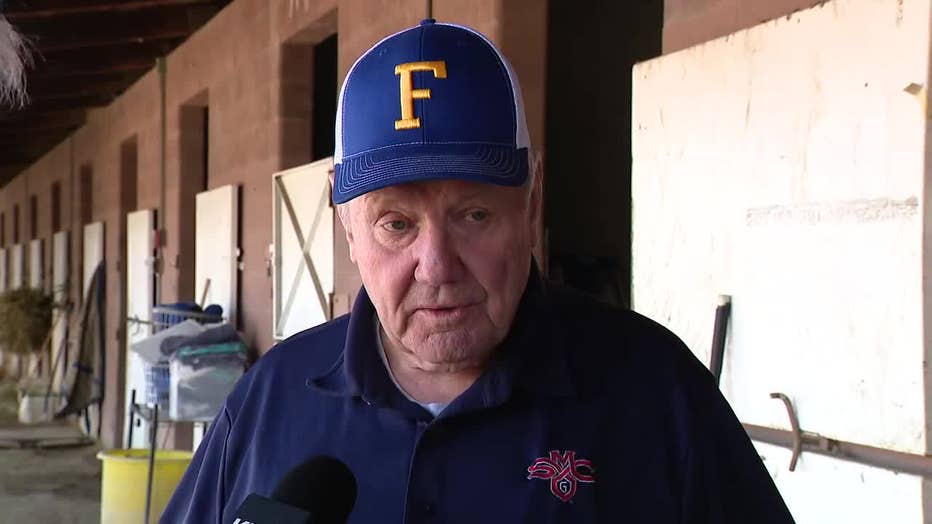
Horse owner George Schmitt speaks to KTVU as horses and their trainers are evicted from the Alameda County fairgrounds on March 25, 2025.
Golden State Racing at the fairgrounds; betting blocked
October 2024
During the summer months, horse racing was on track at the Pleasanton fairgrounds.
And for a short time, it seemed like the gamble to take in the Golden Gate Field horses and buy out the golf contract had been worth it.
The Alameda County Fair horses raced. The State Fair horses raced. Santa Rosa horses raced. Humboldt County horses raced. Fresno County horses raced.
"We are now the home of all racing," Hoban said.
But all that abruptly ended in October 2024.
"From Day 1, we recognized that racing was 50% of the projection," Hoban said. "The ‘handle’ wasn't producing and we were literally bleeding money."
Hoban acknowledged that CARF Executive Director Larry Swartzlander was not able to get The Stronach Group to sign contracts that would allow Golden State Racing on their betting platform.
That meant that gamblers all over the world couldn't see the CARF races on their betting "signals," and therefore not be able to bet on any of the races at the Pleasanton fairgrounds, Hoban explained, which was financially devastating.
This loss led to CARF not being able to pay back $1.9 million in services that it owed the Alameda County Fair.
According to Hoban, Swartzlander struggled for weeks to get a good deal with The Stronach Group, where executives there ultimately left the contract unsigned.
"Unfortunately, the GSR race meet did not deliver on expectations," Hoban wrote in a timeline to his board. "Wagering revenue generated only half of what had been projected, leaving CARF and the Alameda County Fair financially strained."
He said it was clear by December 2024 that the major betting platforms by The Stronach Group "had intentionally boycotted" the Golden State Racing horse races, "contributing to its failure."
In addition, around the same time, Hoban also said that Golden State Racing was "forced" to accept a "purse structure" licensing agreement with the Thoroughbred Owners of California, which many in the north say is controlled by Southern California interests, that they really couldn't afford to pay.
Pointing fingers
Some people criticize Hoban personally for the losses and blunders.
"The buck stops with Jerome," said Donna Perrerone, who is a horse owner and has worked at the barn and the racetrack. "He talks out of both ends of his mouth. He says he supports horse racing, but he turns around and does everything he can not to."
Horse owner Linda Lonnberg of Livermore agreed.
She said that many of the obstacles, like the water board issues, could have been worked out.
Lonnberg wondered why the fair association didn't buy out the golf course in small payments instead of one big lump sum.
"I'm blaming him because he controls the board," she said. "Whatever Jerome says, the board accepts."
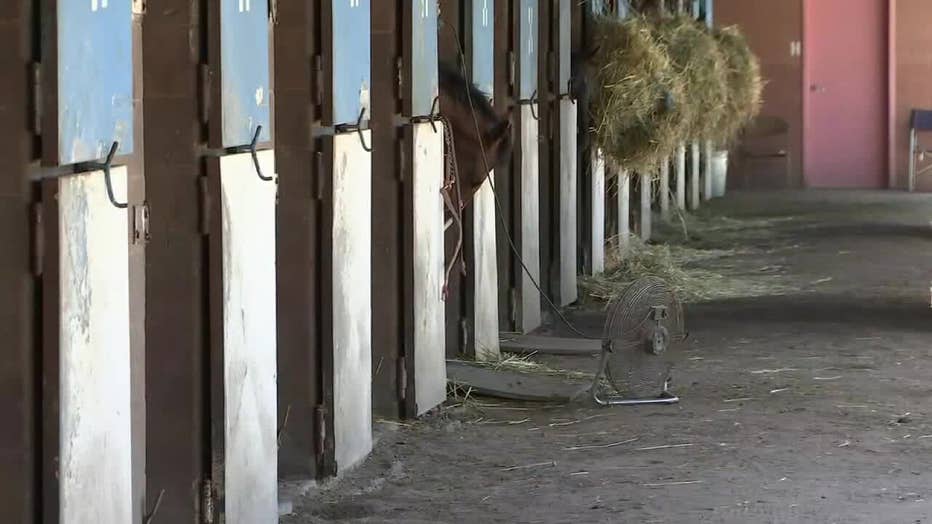
Horse stalls at the Pleasanton fairgrounds.
NorCal racing doomed
January 2025
Because of the financial blow, CARF announced on Jan. 31 that it would no longer support horse racing in Northern California.
That same day, the Alameda County Fair issued its own news release, saying that its 420 fairground horse stables would close in three months.
And a week earlier, on Jan. 21, Michael Flores, deputy secretary for fairs and expositions at the California Department of Food and Agriculture, told a closed-door session of the Alameda County Fair Association that his agency no longer supported horse racing at its Northern California fairs because of the devastating financial losses.
He is a non-voting member of the CARF board.
The news was surprising to Wilson, Haubert's chief of staff, who attended the meeting in order to report back to his boss on what was going on.
"Obviously, this was a shock to us and the board of directors," Wilson wrote in an email to Flores' boss, Karen Ross, secretary of the CDFA. "Moreover, this will also be a shock to over 5,000 employees of jobs that racing has created within our community."
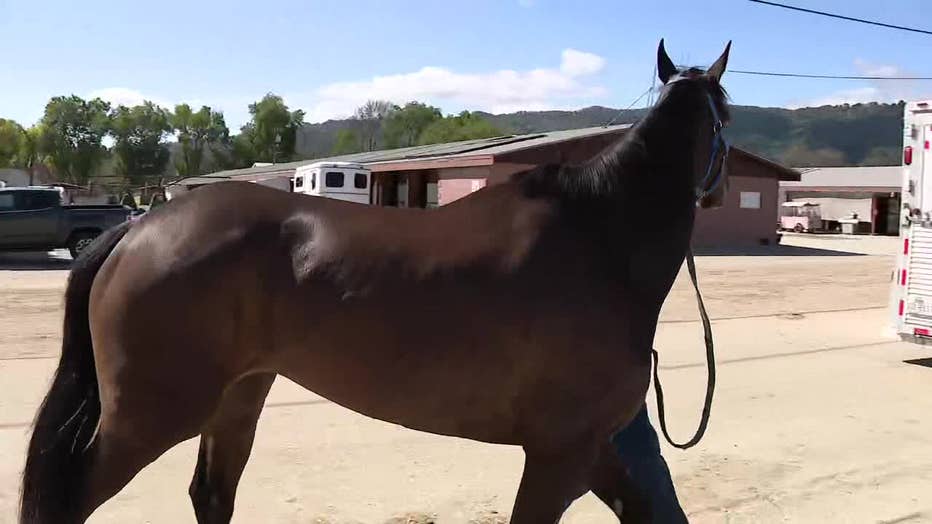
900 horses came from Golden Gate Fields to the Alameda County fairgrounds in June 2024.
Horses and employees evicted from fairgrounds
March 2025
As was announced three months prior, all the horses and at least 500 employees had to leave the Pleasanton fairgrounds on March 25, ending five decades of horse racing at the one-mile track.
"It's very sad for us," assistant horse trainer Ricardo Ruiz said on that day.
Schmitt, who boarded his horses at the fairgrounds, was equally upset.
"The uprooting of people and closing this place down is no good for the city, no good for the fair, no good for anybody," Schmitt said.
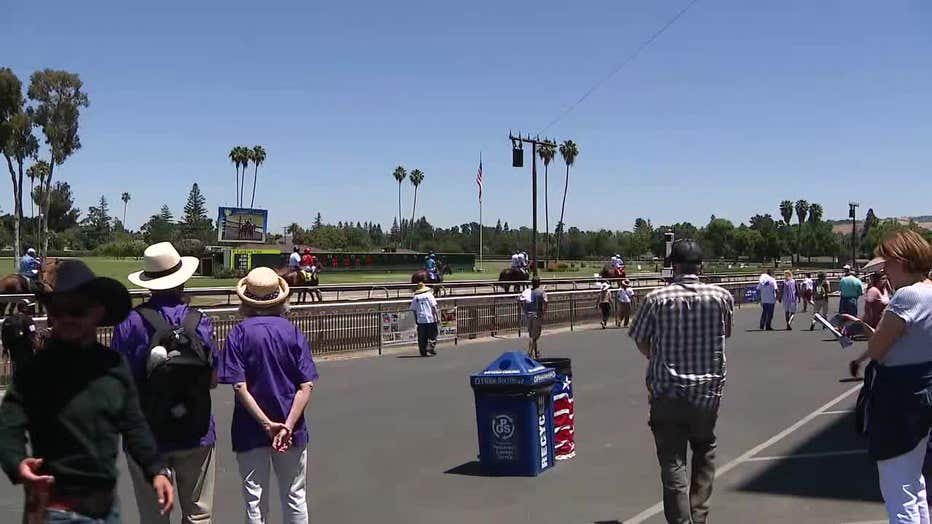
People stand on the racetrack at the Pleasanton fairgrounds.
Small hope to revive racing
April 2025
Since the debacle, there have been some efforts to salvage what is left of horse racing in the north.
Schmitt and his partner, John Harris of Harris Ranch, formed a company, Bernal Park Racing, to possibly race horses for a month in Pleasanton at the fair this summer.
The pair is going to the California Horse Racing board on April 17 to ask for racing dates.
The Humboldt County Fair in Ferndale is also applying for racing dates, and possibly the Fresno County Fair, too.
"We're trying to pull this off," Schmitt said.
Even if their request is granted, Schmitt said there's another big hurdle: Will the horses that were evicted from the Alameda County fairgrounds come back to race in Pleasanton?
He certainly hopes so, but he's not sure if they will.
At least 250 of the former Golden Gate Fields horses are now in Seattle, others have been sold, and the remainder are spread throughout the Los Angeles area.
"If we don't get it done," Schmitt said, "then it's dead."


